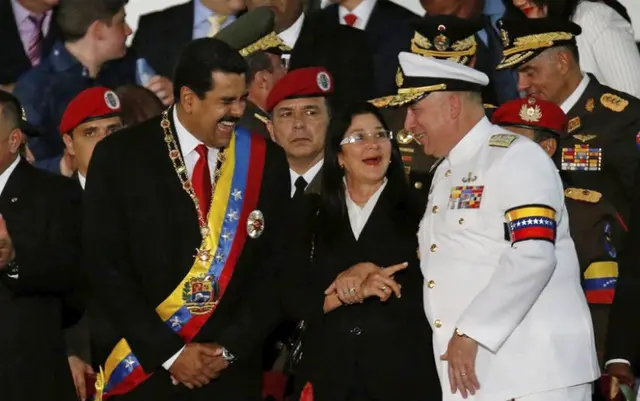Peru expelled Venezuela’s ambassador on Friday as regional pressure built on
President Nicolas Maduro’s government for allegedly trampling his country’s
constitutional order.
The Venezuelan government retaliated by ordering the head of Peru’s embassy
in Caracas to leave and called Peruvian President Pedro Pablo Kuczynski an
“enemy” of Venezuela and of Latin American unity.
Peru gave Ambassador Diego Molero, a former Venezuelan defense minister, five
days to leave the country. As part of what it said was a firm commitment “to
help restore Venezuela’s democracy,” Peru’s administration also refused to
accept a diplomatic protest made by Maduro over Peru’s hosting this week of
foreign ministers from 17 regional nations who refused to recognize the new,
loyalist-packed special assembly that is to rewrite the constitution.
The action by Peru, which was the strongest yet from a Latin American
government, came as the Trump administration weighed putting economic sanctions
on Venezuela to punish Maduro for what Washington calls an illegitimate power
grab.
A few hours later, Venezuela’s foreign ministry announced that it was giving
Peru’s top envoy in Caracas, Carlos Rossi, five days to leave the country. The
statement also said Venezuela’s ambassador in Lima had already returned to
Caracas.
Peru’s president has until recently been a lonely exception among Latin
American leaders in openly condemning Maduro. Kuczynski, a former Wall Street
investment banker who spent decades living in the U.S., is frequently mocked on
Venezuelan state TV and was once referred to as the “empire’s lapdog” by an
official.
In the U.S., meanwhile, President Donald Trump escalated the rhetoric Friday
by saying he hasn’t ruled out military action against Venezuela.
Speaking to reporters at his Bedminster, New Jersey, golf club, Trump
bemoaned the country’s growing humanitarian crisis and declared that all options
remain on the table — including a potential military intervention.
“We have many options for Venezuela and by the way, I’m not going to rule out
a military option,” Trump volunteered, adding, “A military operation and
military option is certainly something that we could pursue.”
On Thursday, Trump said he discussed Venezuela along with North Korea and
Afghanistan in a security briefing with top national security aides and Vice
President Mike Pence. Pence is traveling to Colombia on Sunday to begin a
regional trip that is expected to include discussions on how to deal with
Maduro.
Maduro has tried to deflect the pressure from Washington, and on Thursday he
said he wanted to meet with Trump, perhaps next month at the United Nations
General Assembly in New York.
“Mr. Donald Trump, here is my hand,” the socialist president told delegates
at the constitutional assembly, adding that he wants as strong a relationship
with the U.S. as he has with Russia.
Late Friday, the White House rejected the request to meet with Trump. A
statement released late Friday by the White House press secretary said, “Trump
will gladly speak with the leader of Venezuela as soon as democracy is restored
in that country.”
“Trump has asked that Maduro respect Venezuela’s constitution, hold free and
fair elections, release political prisoners, cease all human rights violations,
and stop oppressing Venezuela’s great people. ... Instead Maduro has chosen the
path of dictatorship,” the press secretary said.
The Trump administration has imposed sanctions on Maduro and more than two
dozen other former and current Venezuelan officials.
Reaction in Latin America has been far more subdued, reflecting long-held
reluctance by much of the region to encroach on a neighbor’s sovereignty and
some lingering ideological affinity for the anti-imperialist revolution started
by the late Hugo Chavez. Several attempts to punish Venezuela at the
Organization of American States have failed due to a lack of consensus.
Maduro’s government has sent mixed signals about how much more confrontation
it is willing to accept.
This week, the government-packed Supreme Court ordered the arrest of two
Caracas-area mayors for protecting protesters in their districts. And on Friday,
Tarek William Saab, installed as chief prosecutor after the constitutional
assembly ousted his outspoken predecessor, warned that he would reopen
investigations against protesters for the use of violence and even destruction
of trees used to build barricades at demonstrations.
At the same time, the constitutional assembly on Friday said it would debate
a proposal to push up to October elections for governors in all of Venezuela’s
states. It’s a possible sign that the government is looking to negotiate a deal
with the opposition, although many question if the constitutional assembly,
which has a free hand to upend institutions, will even allow elections that were
originally slated to take place last year will be allowed to go forward.
Also on Friday, Venezuelan Defense Minister Vladimir Padrino said security
forces have captured the mastermind of a failed assault on a military base a
week ago.
Former national guard Capt. Juan Caguaripano was captured in Caracas along
with an active-duty soldier who allegedly collaborated with a small group of
civilians and former officers that last Saturday raided a major military base in
Valencia and walked off with a cache of weapons.
Padrino called the arrests a “major blow to the fascist terrorism put in
place by the Venezuelan right-wing in the past few months” of anti-government
protests.
Last Saturday’s attack left two people dead and came after Caguaripano, who
went into exile after denouncing Maduro in 2014, released in a video in which he
stood before a group of heavily-armed men in fatigues and called on the armed
forces to rebel.
(AP)
 简体中文
简体中文

